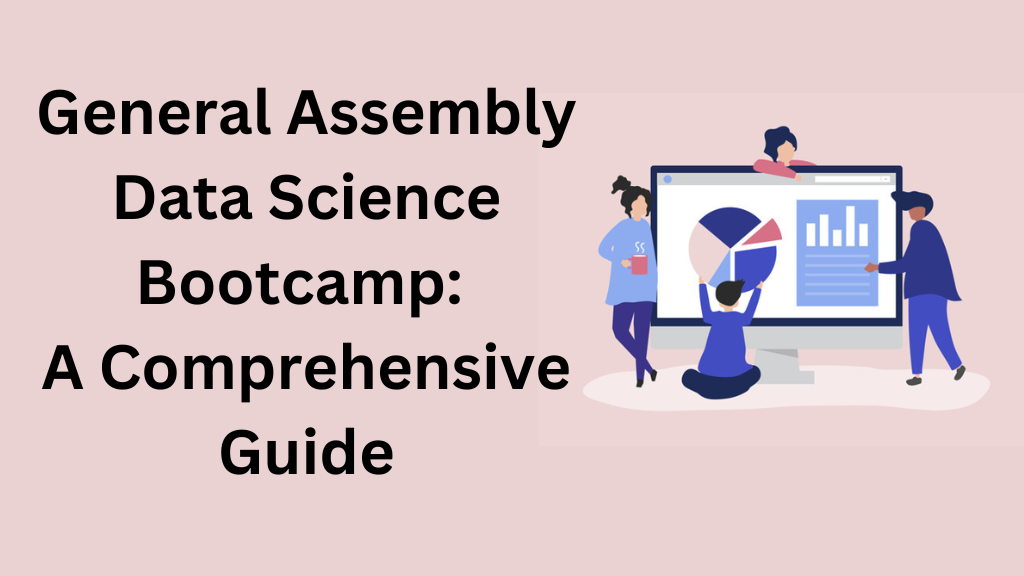I am writing in this aticle about general assembly data science bootcamp the demand for data scientists is at an all-time high. As businesses and organizations strive to make data-informed decisions, the role of data scientists becomes increasingly crucial. One of the most recognized programs for aspiring data scientists is the General Assembly Data Science Bootcamp. This comprehensive guide will delve into every aspect of this bootcamp, from its curriculum and teaching methods to its career support and alumni success stories.
What is General Assembly?
Founded in 2011, General Assembly (GA) general assembly data science bootcamp is a pioneer in education and career transformation, specializing in today’s most in-demand skills. With campuses in major cities worldwide, GA offers full-time, part-time, and online courses in web development, data science, digital marketing, UX/UI design, and more. The mission of General Assembly is to empower individuals to pursue the work they love.
Overview of the Data Science Bootcamp
The General Assembly Data Science Bootcamp is an immersive, 12-week program designed to equip students with the skills and knowledge needed to launch a career in data science. The bootcamp covers a wide range of topics, including data analysis, machine learning, statistical modeling, and data visualization. With a hands-on approach and real-world projects, students gain practical experience and build a strong portfolio to showcase to potential employers.
Key Features
- Duration: 12 weeks (full-time)
- Mode of Delivery: In-person and online
- Prerequisites: Basic programming knowledge and familiarity with statistical concepts
- Cost: Varies by location and mode of delivery (scholarships and financing options available)general assembly data science bootcamp
Curriculum Breakdown
The curriculum of the General Assembly Data Science Bootcamp is structured to provide a comprehensive learning experience, covering the following modules:
1. Introduction to Data Science
The bootcamp begins with an introduction to the fundamental concepts of general assembly data science bootcamp. Students learn about the data science workflow, tools, and technologies commonly used in the field. Key topics include:
- Python Programming: Basics of Python, including data types, control structures, functions, and libraries such as Pandas, NumPy, and Matplotlib.
- Data Wrangling: Techniques for cleaning, transforming, and preparing data for analysis.
- Exploratory Data Analysis (EDA): Methods for summarizing and visualizing data to uncover patterns and insights.
2. Statistical Analysis and Probability
Understanding statistical concepts is crucial for any general assembly data science bootcamp data scientist. This module covers:
- Descriptive Statistics: Measures of central tendency, dispersion, and shape.
- Inferential Statistics: Hypothesis testing, confidence intervals, and p-values.
- Probability Theory: Basics of probability, probability distributions, and Bayesian inference.
3. Data Visualization
Effective data visualization is essential for communicating insights. In this module, students learn general assembly data science bootcamp:
- Visualization Tools: Using libraries such as Matplotlib, Seaborn, and Plotly.
- Best Practices: Principles of effective data visualization and storytelling with data.
- Dashboards: Creating interactive dashboards using tools like Tableau and Power BI.
4. Machine Learning
Machine learning is a core component of data science. This module covers:
- Supervised Learning: Techniques such as linear regression, logistic regression, decision trees, and support vector machines.
- Unsupervised Learning: Clustering algorithms like k-means, hierarchical clustering, and principal component analysis (PCA).
- Model Evaluation: Metrics and methods for evaluating model performance, including cross-validation and ROC curves.
5. Advanced Machine Learning and Deep Learning
Building on the basics, this module delves into advanced machine learning techniques and introduces deep learning general assembly data science bootcamp:
- Ensemble Methods: Techniques like random forests, gradient boosting, and stacking.
- Natural Language Processing (NLP): Text processing, sentiment analysis, and topic modeling.
- Deep Learning: Introduction to neural networks, convolutional neural networks (CNNs), and recurrent neural networks (RNNs) using frameworks like TensorFlow and Keras.
6. Big Data and Data Engineering
Managing and analyzing large datasets requires specialized tools and techniques. This module covers:
- Big Data Technologies: Introduction to Hadoop, Spark, and distributed computing.
- Data Pipelines: Designing and building data pipelines for ETL (Extract, Transform, Load) processes.
- Databases: Working with SQL and NoSQL databases.
7. Capstone Project
The capstone project is a highlight of the bootcamp, allowing students to apply their skills to a real-world problem. Students work on a project of their choice, general assembly data science bootcamp from data collection and analysis to model building and presentation. This project is a critical component of the bootcamp, as it provides a tangible demonstration of the students’ abilities to potential employers.
Teaching Methods and Learning Experience
The General Assembly Data Science Bootcamp employs a variety of teaching methods to ensure a rich and engaging learning experience:
1. Interactive Lectures
Lectures are delivered by experienced instructors who are industry professionals. These lectures cover theoretical concepts and practical applications, ensuring that students gain a deep understanding of the material.
2. Hands-on Exercises
Hands-on exercises and coding challenges are integrated into the curriculum to reinforce learning. These exercises allow students to apply what they’ve learned in a practical context and develop their problem-solving skills.
3. Real-world Projects
Throughout the bootcamp, students work on real-world projects that mimic the challenges faced by data scientists in the industry. These projects help students build a portfolio that showcases their skills and expertise.
4. Collaboration and Peer Learning
Collaboration is encouraged through group projects and peer reviews. Students work together to solve problems, share knowledge, and learn from each other’s experiences. This collaborative environment fosters a sense of community and prepares students for the team-oriented nature of data science work.
5. Mentorship and Support
General Assembly provides mentorship and support to help students succeed. Instructors and teaching assistants are available to answer questions, provide feedback, and offer guidance throughout the bootcamp. Additionally, career coaches assist with job search strategies, resume building, and interview preparation.
Career Support and Outcomes
One of the standout features of the General Assembly Data Science Bootcamp is its robust career support services. GA is committed to helping students transition into data science roles and offers a range of resources to facilitate this process.
1. Career Coaching
Career coaches provide personalized support to help students navigate the job market. Services include:
- Resume and LinkedIn Reviews: Tailoring resumes and LinkedIn profiles to highlight relevant skills and experiences.
- Interview Preparation: Conducting mock interviews and providing feedback to improve interview performance.
- Job Search Strategies: Identifying job opportunities, networking strategies, and tips for effective job applications.
2. Networking Opportunities
GA hosts events and workshops to connect students with industry professionals and alumni. These networking opportunities allow students to build relationships, gain insights into the industry, and explore potential job openings.
3. Employer Partnerships
General Assembly has partnerships with a wide range of companies that are looking to hire data science talent. These partnerships provide students with access to exclusive job opportunities and increase their chances of landing a job after graduation.
4. Alumni Network
The GA alumni network is a valuable resource for graduates. Alumni can connect with each other for mentorship, job referrals, and professional development opportunities. This network also provides a sense of community and ongoing support as graduates advance in their careers.
Success Stories and Testimonials
The success of the General Assembly Data Science Bootcamp is reflected in the stories of its alumni. Here are a few testimonials from graduates who have launched successful careers in data science:
- Jane Doe: “The GA Data Science Bootcamp was a game-changer for me. The hands-on projects and real-world applications gave me the confidence and skills to land a job as a data scientist at a leading tech company. The career support was invaluable, helping me polish my resume and ace my interviews.”
- John Smith: “I was looking to pivot my career into data science, and GA provided the perfect platform to do so. The instructors were knowledgeable and supportive, and the curriculum was comprehensive. I now work as a data analyst, and I couldn’t be happier with my decision to join GA.”
- Emily Johnson: “The capstone project was the highlight of the bootcamp for me. It allowed me to showcase my skills to potential employers and gave me a tangible project to discuss during interviews. The networking opportunities were also fantastic, and I made connections that helped me secure my first data science role.”
The General Assembly Data Science Bootcamp is a comprehensive program designed to equip aspiring data scientists with the skills and knowledge needed to succeed in the field. With a robust curriculum, hands-on projects, and extensive career support, GA provides a pathway for individuals to transition into data science roles and thrive in their careers. Whether you’re looking to pivot your career or enhance your existing skills, the GA Data Science Bootcamp offers a transformative learning experience that can help you achieve your professional goals.

